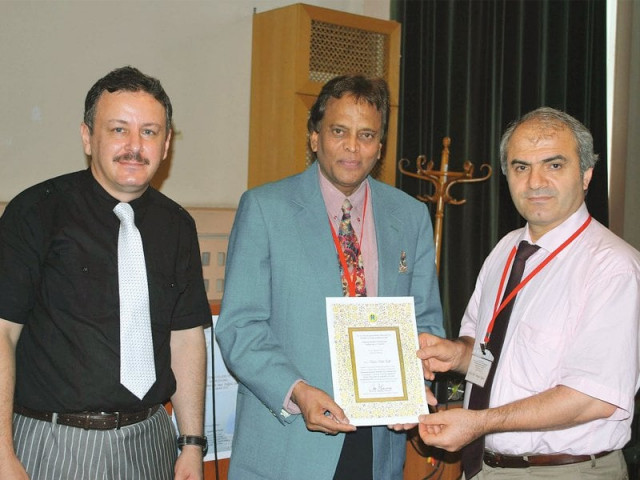‘Urdu will survive the test of time’
Pakistani-Canadian poet and broadcaster launched his channel in 2012.

Zulfi has over 30,000 viewers for Urdu channel in Canada. PHOTO: FILE
In 2000, Tasleem Elahi Zulfi took an early retirement from Air Canada in Toronto. He had a simple reason to leave: he planned to launch a TV channel. 12 years later, Zufli’s project, Urdu TV, is one of the most popular desi cable channels among Canada’s South Asian community.
It would be difficult to pin down Zulfi’s nationality if he did not self-identify as a Pakistani-Canadian. Born in Agra a month before Pakistan’s creation, Zulfi moved with his parents to Saudi Arabia two years after. When he returned for studies nine years later, Ayub Khan imposed Martial Law in the country the very next day. He is quadrilingual and has written 18 books to date, one of which even won him Pakistan’s third highest civilian award, the Sitara-e Imtiaz.
Zulfi worked as an aeronautical engineer for 30 years, first with the Saudi Airlines and then with Air Canada. Somehow his childhood interest for writing, radio and TV survived the roar of airplane engines and the clatter of ground service equipment.
Once his children, he decided to go for his longtime ambition. Zulfi was not new to the arts when he applied for the channel’s license in 1997. By then, he was already a published author with seven books to his name, including four collections of poetry. He had also worked at Radio Pakistan and Pakistan Television during his student years in Karachi in the late ‘60s.
But even then, running a 24-hour entertainment channel is not easy. He needed support to cover the 1.5 million Canadian dollars capital required for the project and help generate the channel’s content. “I got two business partners for the project,” says Zulfi as he shares that one of his partners is Sikh Punjabi, and the other a Hindu.
Although, the channel’s name might not represent the Hindi and Punjabi languages, its shows do. “We don’t do four hours [of one language] in a row,” Zulfi says. “One programme is in Urdu, the next in Hindi or Punjabi, so that everyone stays tied to the channel.”
The appeal of the shows to the larger South Asian community, and not just Pakistani Canadians, might be a reason behind its success: Urdu TV has over 30,000 paid cable subscribers across Canada.
Zulfi’s team includes some senior PTV actors that are now settled in Canada. Like the widely known composer Sohail Rana, famous for Waheed Murad-starrers such as Arman and Doraha, is the channel’s music director.
“I got them onboard for programme production,” says Zulfi who works as a TV host and newscaster himself. He takes pride in the channel’s ‘family programmes’ and says 75 % of the channel’s content is created locally.
The rest — dramas, musical shows, current affairs programmes and interviews — are imported through Pakistan’s TV Producers Association on a daily-basis.
Despite the broadcast channel’s success, Zulfi remains a poet at heart.
“Poetry is my first love,” he says. “And among poetry genres, ghazal is my favourite.” Perhaps that is why he was so fascinated by Pakistan’s legenedary poet, Faiz Ahmed Faiz, that when Faiz sought asylum in Lebanon in 1968, Zulfi, who worked for Saudi Airlines at the time, transferred to the airline’s Beirut station.
The book Zulfi wrote about Faiz’s exile, Faiz Ahmed Faiz Beirut Mein, is one of his crowning achievements. His book shows Faiz in exile as a forlorn poet, depressed by the absence of fellow Urdu speakers and the lack of good company.
Zulfi proudly says he still has rough drafts of poems from Faiz’s Meray Dil Meray Musafir, which Faiz wrote while in Beirut. But Zulfi believes poetry has changed since 9/11.
“Because of the levels of insecurity in the society, writers and poets are more alert and self-accountable in their writings,” he says. “Love used by the topic of poetry, but now we portray the fear we see all around us.”
He remains confident, however, that Urdu will survive the test of time. He says Urdu travels with the people who migrate away from the Indian subcontinent.
Published in The Express Tribune, January 3rd, 2013.
Like Life & Style on Facebook for the latest in fashion, gossip and entertainment.



















COMMENTS
Comments are moderated and generally will be posted if they are on-topic and not abusive.
For more information, please see our Comments FAQ